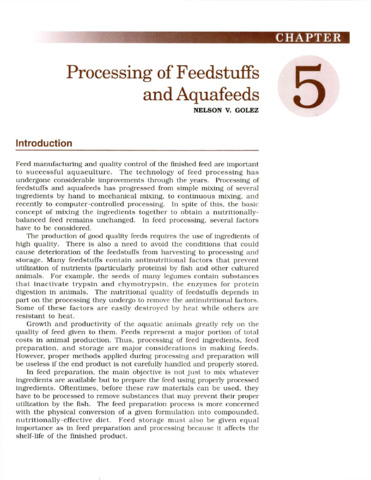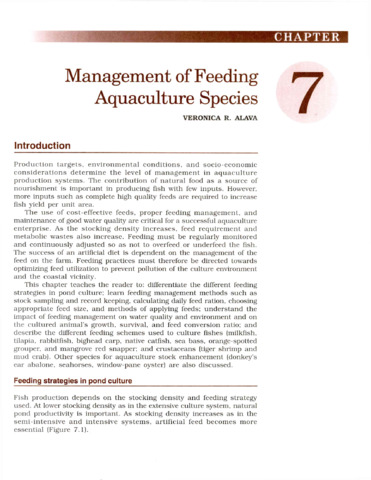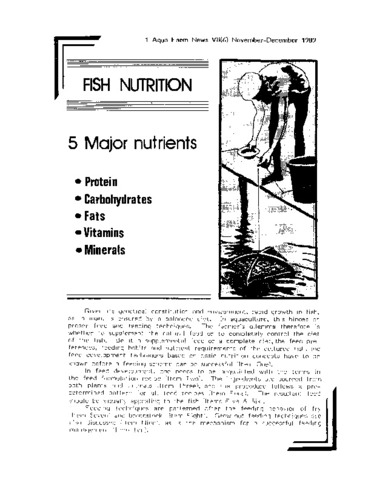Processed meat solubles, protamino aqua, used as an ingredient in juvenile shrimp feeds
| dc.contributor.author | Millamena, Oseni M. | |
| dc.contributor.author | Golez, Nelson V. | |
| dc.contributor.author | Janssen, J. A. J. | |
| dc.contributor.author | Peschcke-Koedt, M. | |
| dc.date.accessioned | 2014-01-10T08:38:21Z | |
| dc.date.available | 2014-01-10T08:38:21Z | |
| dc.date.issued | 2000 | |
| dc.identifier.citation | Millamena, O. M., Golez, N. V., Janssen, J. A. J., & Peschcke-Koedt, M. (2000). Processed meat solubles, protamino aqua, used as an ingredient in juvenile shrimp feeds. The Israeli Journal of Aquaculture-Bamidgeh, 52(3), 91–97. | en |
| dc.identifier.issn | 0792-156X | |
| dc.identifier.uri | http://hdl.handle.net/10862/1876 | |
| dc.description.abstract | The nutritive value of processed meat solubles, Protamino Aqua, a by-product from slaughter-houses, was examined in a growth trial with juvenile tiger shrimp Penaeus monodon. Experimental diets were formulated to contain processed meat solubles and/or squid meal as a partial replacement of fish meal. Dietary treatments consisted of diets (1) 5% processed meat solubles, no squid meal; (2) 2% processed meat solubles and 3% squid meal; (3) 5% squid meal, no meat solubles; (4) no meat solubles, no squid meal (control) and (5) commercial shrimp feed. The water stability of the diets was tested. Diets were fed to P. monodon postlarvae, PL20, with a mean body weight of 0.014 g, reared in tanks for 60 days. Results showed that survival of shrimp fed the various diets did not significantly differ (p>0.05). The only significant difference in growth performance was that the weight gain of shrimp fed diet 3 was significantly better (p<0.05) than that of shrimp fed the control diet. The protein efficiency ratio was best in shrimp fed diets containing processed meat solubles and poorest in shrimp receiving commercial feed. Protamino Aqua has a water stability similar to that of the control diet and commercial feed and appears to be efficiently utilized by juvenile P. monodon. The study showed that processed slaughterhouse by-products can be a cost-effective replacement for fish meal in tiger shrimp feeds. | en |
| dc.description.sponsorship | This collaborative project was funded by daka a.m.b.a., Løsning, Denmark. | en |
| dc.language.iso | en | en |
| dc.publisher | Society of Israeli Aquaculture and Marine Biotechnology | en |
| dc.subject | Penaeus monodon | en |
| dc.title | Processed meat solubles, protamino aqua, used as an ingredient in juvenile shrimp feeds | en |
| dc.type | Article | en |
| dc.citation.volume | 52 | |
| dc.citation.issue | 3 | |
| dc.citation.spage | 91 | |
| dc.citation.epage | 97 | |
| dc.citation.journalTitle | The Israeli Journal of Aquaculture-Bamidgeh | en |
| seafdecaqd.library.callnumber | VF SJ 0710 | |
| seafdecaqd.databank.controlnumber | 2000-46 | |
| dc.subject.asfa | by-products | en |
| dc.subject.asfa | diet | en |
| dc.subject.asfa | feed composition | en |
| dc.subject.asfa | feeding experiments | en |
| dc.subject.asfa | growth rate | en |
| dc.subject.asfa | juveniles | en |
| dc.subject.asfa | nutritive value | en |
| dc.subject.asfa | shrimp culture | en |
| dc.subject.scientificName | Penaeus monodon | en |
Files in this item
| Files | Size | Format | View |
|---|---|---|---|
|
There are no files associated with this item. |
|||
This item appears in the following Collection(s)
-
Journal Articles [1262]
These papers were contributed by Department staff to various national and international journals.



